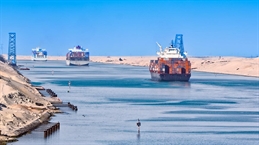
The UN Conference on Trade and Development (UNCTAD) signalled that the attacks on Red Sea shipping which have severely affected shipping through the Suez Canal, added to existing geopolitical and climate-related challenges, are reshaping the world's trade routes.
In its newly-released report — “Navigating Troubled Waters. The Impact to Global Trade of Disruption of Shipping Routes in the Red Sea, The Black Sea and the Panama Canal” — the UN agency dealing with trade and development said in the wake of the recent attacks on shipping, the Red Sea's maritime trade routes through the Suez Canal have become "severely disrupted" further impacting the global trade landscape.
"This development compounds the ongoing disruption in the Black Sea due to the war in Ukraine, which has resulted in shifts in the oil and grain trade routes, altering established patterns," UNCTAD said.
Additionally, the Panama Canal — a critical artery linking the Atlantic and Pacific Oceans — is confronting a separate challenge: dwindling water levels.
The UN agency noted that diminished water levels in the canal have raised concerns about the long-term resilience of global supply chains, underscoring the fragility of the world's trade infrastructure.
UNCTAD estimates that transits passing the Suez Canal decreased by 42% compared to its peak.
It added that with major players in the shipping industry temporarily suspending Suez transits, weekly container ship transits have fallen by 67%, and container carrying capacity, tanker transits, and gas carriers have experienced significant declines.
Meanwhile, total transits through the Panama Canal plummeted by 49% compared to its peak.
Costly uncertainty
UNCTAD noted that mounting uncertainty and shunning the Suez Canal to reroute around the Cape of Good Hope is also having both an economic and environmental cost, also representing additional pressure on developing economies.
It said that growing significantly since November 2023, the surge in the average container spot freight rates registered the highest ever weekly increase growing by US$500 — in the last week of December.
UNCTAD noted that this trend has continued as average container shipping spot rates from Shanghai more than doubled since early December (+122%), growing more than threefold to Europe (+256%) and even above average (+162%) to the United States West coast, despite not going through Suez.
"Ships are avoiding the Suez and the Panama Canals and seeking alternative routes. This combination translates into longer cargo travel distances, rising trade costs and insurance premiums," the report said.
Furthermore, the report pointed out that greenhouse gas emissions are also growing from having to travel greater distances and at greater speeds to compensate for the detours.
UNCTAD said the Panama Canal is "particularly important" for the foreign trade of countries on the West Coast of South America, as approximately 22% of total Chilean and Peruvian foreign trade volumes depend on the Canal and Ecuador is the country most dependent on the Canal with 26% of its foreign trade volumes crossing the Canal.
UNCTAD noted that foreign trade for several East African countries is also highly dependent on the Suez Canal, with approximately 31% of foreign trade by volume for Djibouti being channelled through the Suez Canal.
For Kenya, the share is 15%, and for Tanzania it is 10%.
In terms of environmental impact from longer transit distances, the report estimates that higher fuel consumption resulting from longer distances and higher speeds could result in up to 70% rise in greenhouse gas emissions for a Singapore-Rotterdam round trip.



